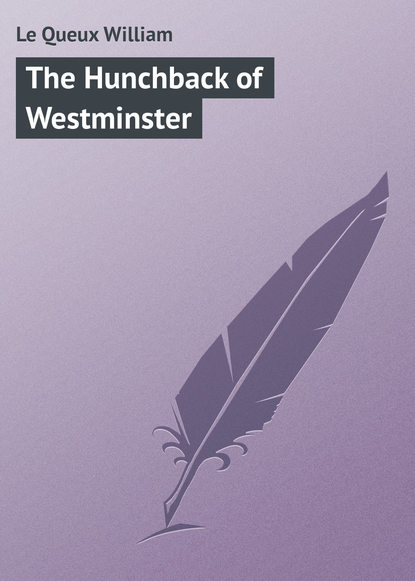 Полная версия
Полная версияThe Hunchback of Westminster
“Luckily, I am pretty obstinate,” he went on, “and I won, hands down. Straight away he got two or three doctor friends together, and they cooked up a certificate about the state of his health; he rushed off to Buckingham Palace and handed over his resignation to the king, who, fortunately, happened to be in town; and, after various audiences, the Premier about an hour ago appointed the Marquis of Penarth in his place. In the Cabinet it is pretty well known how I managed it, but nobody regrets Cuthbertson’s downfall. He was too proud, too overbearing, too insolent for the position, and all the members of the House whom I have spoken to seem to be relieved at his resignation and hurried departure to that old castle of his up in Galloway.”
“And what,” asked José, “has become of my father and brother?” And his face was pale and his eyes full of tears.
“I am sorry to say they have both bolted. The Home Secretary sent after them regarding the loss of certain plans from the Woolwich Arsenal, but they took fright over the forgeries and Cuthbertson’s threats and slipped off to Greenwich, from which they got a tramp steamer to take them to some foreign port, whence they can flee up country and gain a quasi kind of protection, which it won’t pay England to fight – probably in Portugal or Spain, or even in Greece, with which country, I understand, we have no extradition treaty whatever.”
“And you, colonel,” I asked, turning to Napier. “How did you come to forgive us?” I queried.
The old soldier broke into a hearty laugh. “Oh! that wasn’t difficult when such a magician as Cooper-Nassington set to work. He told me the whole of the facts, whereas Fotheringay had only explained to me half!”
And under the table-cloth Doris’ small hand found mine, and gave me a sweet little token of satisfaction, trust, and content. Already I felt more than repaid for the misunderstanding I had suffered.
Little more remains to be told.
Only next day the papers came out with the true account of Bernard Delganni’s suicide, and there is no doubt in my mind now that he was the man who stabbed the colonel’s spaniel, which was said to sleep usually in the colonel’s room.
Soon after this the expedition to Mexico set sail, and now any day we may hear that, with the aid of the old Jesuits’ chart and the information contained in the yellow parchments, Beckworth’s sacred lake has actually been drained off and England in possession of a practically inexhaustible mine of wealth. Every day I open my newspaper I look for this welcome intelligence, and every day I am certain brings us nearer the consummation of this discovery. One day before long the sacred lake, which is already located and has been sounded, will be run dry by a tunnel which is being cut through a small mountain, and when this is accomplished it will bring joy and solid relief to the heart of every taxpayer and Englishman. The wealth known to be in the bed of the lake is enormous, and some of the gems and gold ornaments recovered are already in London. That Fotheringay has got a place in the expedition gives me no concern. He was never really bad, and chances of redemption should be given to all, although Casteno has really never forgiven him that trick with the sham nurses.
The Order of St. Bruno still flourishes under Mr Cooper-Nassington’s guidance, and anyone who desires to join it should address my friend, the Member of Parliament, at the House of Commons. I have but thinly disguised his identity in these chapters, and any serious patriot could discover his real name by a little judicious inquiry, say from the chairman of the Press Gallery, who knows twice as much of the secret history of our legislative establishment as, notwithstanding what croakers over press morality assert, ever finds its way into print.
The Order has, I am compelled to record, lost two of its active members. One, José Casteno, who has married that very charming girl, Camille Velasquon, and set sail for Mexico, hot on the heels of the British expedition to Tangikano, and also to see that Fotheringay goes straight. The other, my poor, graceless self, who, now that Doris has become my wife, no longer figures in Stanton Street, WC, as a secret investigator, but lives out at Redhill, and goes daily to his chambers in the Temple – Lawyers’ Land – to lay the foundation of a barrister’s practice, aided by poor Naylor, who was retired compulsorily from Scotland Yard upon a small pension, but who, I find, makes an admirable clerk when it comes to a hand-to-hand tussle with solicitors, who ever want more than their true pound of flesh.
And so for the present, with the others, I must make my adieu!
When England is startled, as she will be one day ere long, by the announcement of the recovery of the enormous treasure of Tangikano, the emeralds and rubies unequalled in the world, and the wonderful images and utensils of solid gold that have been hidden for ages in the slime beneath those silent waters, then will you, perhaps, recollect the chapters of an eventful history which I have recorded in the foregoing pages, and remember what part in the modern drama of London life was played by the man once known to connoisseurs and collectors as the Hunchback of Westminster.

